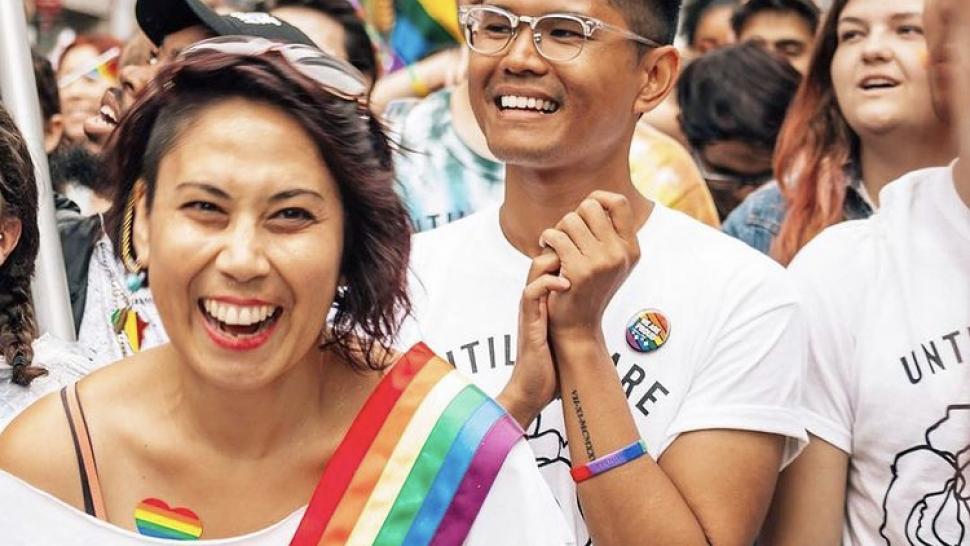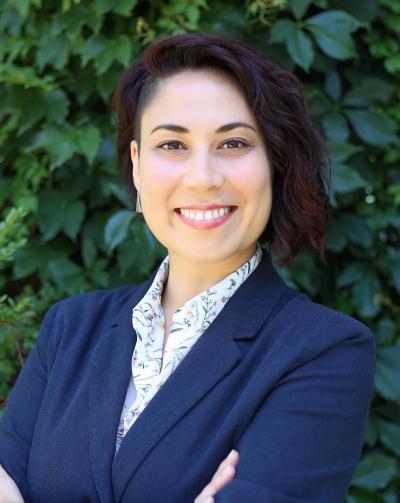
Kathryn Mettler (left) and Michael Butac (right) walk in the the Pride parade in 2019, the year Mettler was nominated as Humber's Pride Marshall.
Mindfulness and positive mental health can help students succeed in their studies and personal lives and in their future careers. Mental wellness, however, can be hard-won.
Kathryn Mettler is a professor in Humber’s Faculty of Community and Social Services and has worked in community-based social services for 20 years. She is currently completing her PhD in social sciences with a focus on vicarious trauma.
In her class on Trauma-Informed Practice, Mettler helps students develop and understand the diverse needs of trauma survivors and how they experience trauma - while still supporting their mental health in the classroom.
“I wanted to think about how I can model trauma-informed approaches in the classroom so students can learn about the practice but also have an experience of the practice. There are these principles that centre around creating safety, building trust and forming relationships around collaboration,” she said.
The difference between safe and comfortable
Mettler made an impression on her former student, case manager Michael Butac, even before she taught the first lesson of the semester.
“She may be one of the only profs who introduced herself the first day of class with her pronouns. As a gay person sitting in a class with mainly straight folks, this made me feel welcome and safe,” he said.
Mettler has intentionally created an environment that supports the feeling of safety. 
However, one of the more challenging conversations she has in class is the difference between unsafe and uncomfortable. The term “safe space” has become universally accepted, but often confused with “comfortable space,” according to Mettler.
“We’re going to have uncomfortable conversations, but that doesn’t mean it’s not safe. We have to build our skillfulness in trauma-informed approaches. Saying ‘this is a safe space’ doesn’t make it so,” she said.
She notes that an important feature of trauma-informed practice is creating that safety together. Everyone in the classroom has rights and responsibilities.
Butac’s experience in class directly impacts the youth he works with.
“Some specific examples are how I'm welcoming a youth into the space -- introducing myself with my pronouns, asking if they need to use the bathroom or need a glass of water and providing them with information prior to a meeting so that it can relieve some of their anxiety.”
Beyond cancel culture
Having taught since 2016, Mettler has encountered challenges that spring from swift social change. Instances of racism within the classroom have come up.
She leans into those situations of unease.
“I want to unpack it while still keeping people involved. We’re trying to find a way to engage in a conversation with a diverse group of people with diverse life experiences while also identifying hurtful, harmful, judgmental behaviours,” she said.
The examination of bias and privilege is crucial to work in the social services sector.
“I feel like every job posting I've seen and every job interview I had mentioned trauma-informed practice,” said Butac.
“Knowing that homeless, racialized LGBTQI2S youth are at greater risk of experiencing trauma than their white, heteronormative, housed peers has allowed me to work in a way that is respectful of their experiences and it has helped me build great working relationships with them,” he said.
Professor most likely to...
The subject matter was heavy, but Mettler presented it in a way that allowed Butac to meaningfully engage with the material and graduate ready to work.
“The assignments and class work were a variety of methods such as art, group projects and scenario work. This made the content so much more memorable.”
The COVID-19 pandemic and resulting virtual course delivery has challenged Mettler’s practice as it has become harder to ‘read the room.’
Still, she invites people to move around at the beginning and the end of class and checks in throughout her instruction. There is still an element of connection to her lessons as Mettler engages the entire class in discussions that are as compelling as they are challenging.
Her students tease that she is the “professor most likely to check in too often,” which she comes by honestly.
Mettler admits it’s fitting, but she owns the title because those uncomfortable conversations – and the feelings surrounding them – are crucial to moving forward.